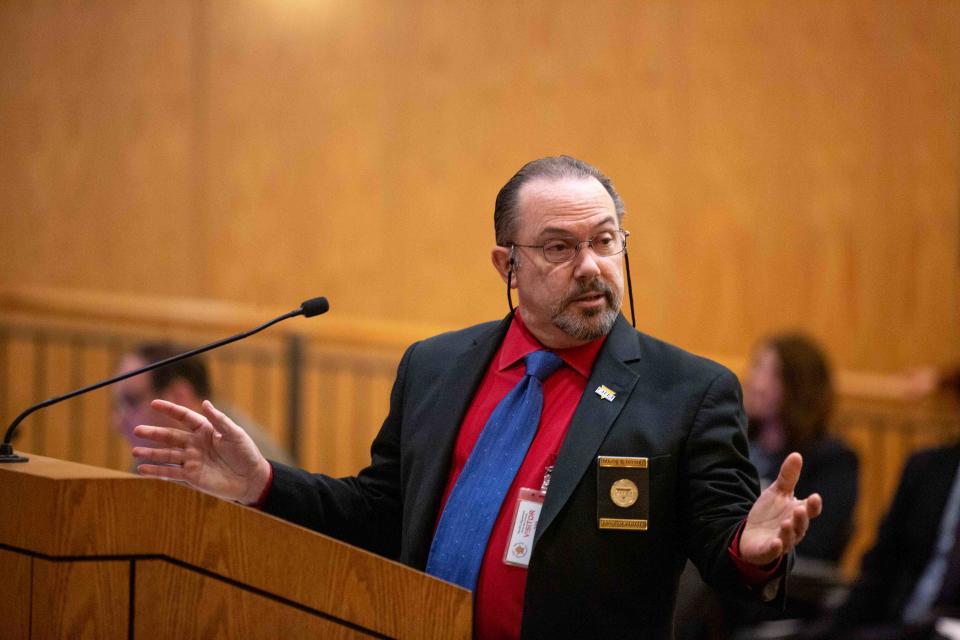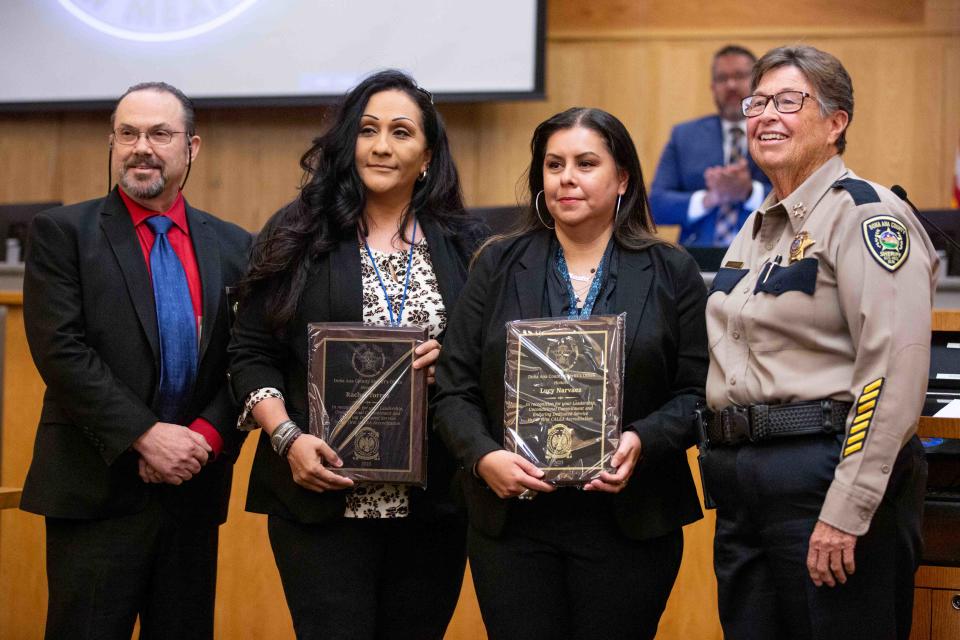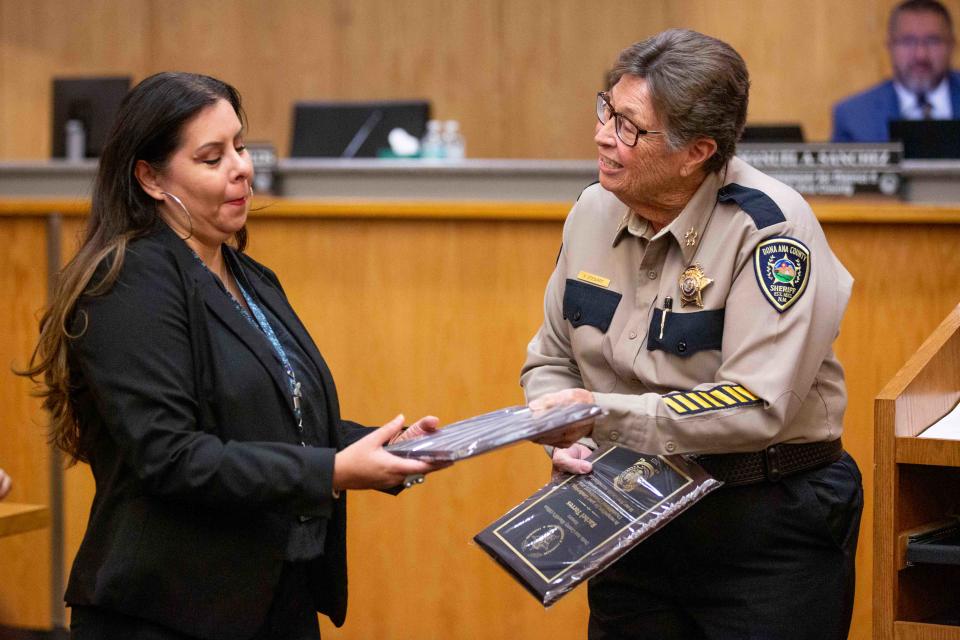Las Cruces, Doña Ana County seek police accreditation, saying better policing will follow
A national police organization granted accreditation to the Doña Ana County Sheriff's Office this month, marking a milestone in professionalization efforts, according to police officials.
The move represents a stamp of approval from the Commission on Accreditation for Law Enforcement Agencies (CALEA). The organization was born in 1979 out of federal efforts to reform police following the 1965 Watts Rebellion in Los Angeles, California, and other high-profile incidents.
That history is relevant, local officials told the Sun-News, since local agencies face scrutiny for contemporary police killings and misconduct allegations.
DASO received accreditation on Nov. 11. The county recognized its efforts during a meeting on Nov. 28. Meanwhile, the Las Cruces Police Department said it started the process this year.
"It's no longer about 'because we've always done it this way.' No, that goes out the window," said Rob Gutierrez, a lieutenant with LCPD who oversees internal affairs and LCPD's accreditation effort. "We're doing this because there's a need for it. And because it's right."

DASO and LCPD stressed that the move would increase transparency via better reporting and stricter procedure adherence. DASO and LCPD also said CALEA accreditation can increase public trust and reduce insurance liability and costs.
"There's no good old boy system," said Brian Johnston, a DASO sergeant overseeing the CALEA accreditation process for DASO. "We've created a process in which nothing gets swept under the rug."
Police misconduct in Doña Ana County and Las Cruces and its role in accreditation
LCPD and DASO have faced scrutiny in recent years after high-profile misconduct incidents.
For LCPD, one officer faces criminal charges for killing a man at a gas station in 2021, while another is under investigation for killing a woman after cursing her out in 2023. The lasting effects of the police killings of Amelia Baca in 2021 and Antonio Valenzuela in 2020 continue to loom over LCPD.
For DASO, a sheriff's deputy was fired and faces criminal charges. Police discovered footage of the deputy sexually assaulting a woman he was arresting. They said he then tried to cover up evidence.
When asked if DASO sought accreditation because of these events, officials said the events played a role.
"We don't want to sit there and see any agency within any community, particularly ours, making national news for a bad shoot," said DASO Major John Day.
"In our case, it was somebody who committed a crime on duty," DASO Sheriff Kim Stewart said. "But it was because of our policies that we caught that early."

How CALEA accreditation works – and what it costs
DASO joins a small but growing group of accredited departments in New Mexico. CALEA has accredited the New Mexico State Police, the Farmington Police Department, the Los Alamos Police Department, and the Hobbs Police Department before DASO. LCPD and Roswell Police Department are in the self-evaluation phase of the process.
CALEA accreditation comes in five steps.
First, departments enroll in CALEA, expressing interest in completing the process. Second, departments undertake a 36-month self-evaluation where they review policies and procedures, compare them to global best practices standards, and implement changes to move into compliance with those best practices.
"They look into each and every little dark area where agencies can hit the headline news," Johnston said. "They ensure that we're up to standard."
Third, CALEA evaluators come to the department and review the changes. Finally, CALEA reviews the departments and determines if accreditation is warranted.
This process is not free. DASO paid about $16,000 for accreditation and will pay $5,000 yearly for re-accreditation, according to DASO statements and CALEA's website. LCPD will pay similar rates.
More departments seeking accreditation amid police killings, reform calls
As the Board of County Commissioners prepared to honor DASO's accomplishments during a meeting on Nov. 28, DASO brought along a member of CALEA to discuss the organization with county commissioners.
Mark Mosier, a regional program manager, told the Sun-News that CALEA has seen an increase in interest following the 2020 police killings of George Floyd and Brenna Taylor and subsequent protests and uprisings across the U.S.
"It really sparked other agencies looking internally at what they're doing. And wanting not to be that next agency," Mosier said.
But even as public expectations around police professionalization increase, Mosier said CALEA isn't interested in seeing accreditation become mandatory.

"If you're not willing to do it on a voluntary basis, being forced to do it, you're not going to get the best product ever," Mosier said. "That's not the point of accreditation. You got to live it. You got to breathe it."
Mosier sang the praises of DASO during the meeting on Nov. 28. He said that few departments that CALEA reviewed were as professional as DASO during the process.
Research can't prove it reduces misconduct but recommends accreditation anyway
While local police officials espouse the benefits of accreditation, academic research about effectiveness is limited.
A 2013 white paper arguing for police professionalization found that police departments with clear policies and procedures were less likely to see officers engage in corruption and were less likely to experience a loss of trust from the public, internal discipline problems, misconduct, and excessive use of force incidents.
However, a 2020 study muddled those findings.
Robert Rodriguez, who conducted the study with Walden University, reviewed 44 studies from 2016 to 2020 and conducted surveys on police departments in Georgia.
Rodriguez was attempting to determine if accreditations like CALEA reduced police misconduct. Ultimately, Rodriguez could not prove that accredited agencies had fewer misconduct incidents.
Rodriguez found that CALEA-accredited agencies in Georgia reported more instances of misconduct. He attributed the uptick to the accreditation. He said accreditation and the desire to remain accredited forced departments to document all misconduct accusations. By contrast, Rodriguez said unaccredited agencies often wrote off accusations they deemed frivolous.
Still, Rodriguez argued that accreditation and accountability go hand-in-hand, even if the data can't confirm that.
"Agencies participating in CALEA accreditation or state certification subject themselves to hundreds of standards, with all these standards being associated with the best practices," Rodriguez said. "This level of scrutiny has a direct nexus with accountability and legitimacy as a law enforcement agency."
Justin Garcia is a reporter for the Las Cruces Sun-News. He can be reached at JEGarcia@LCSun-News.com.
This article originally appeared on Las Cruces Sun-News: Las Cruces, Doña Ana seek police CALEA accreditation. Here's why

